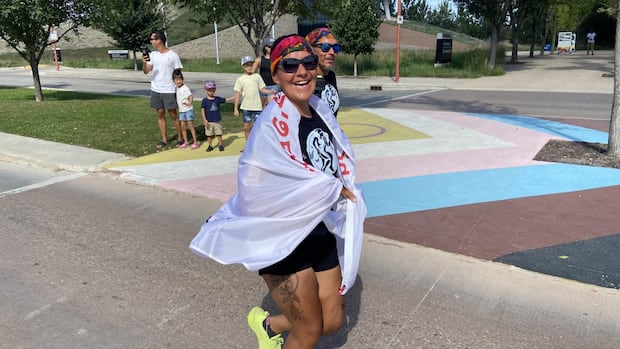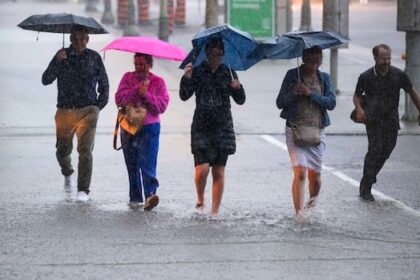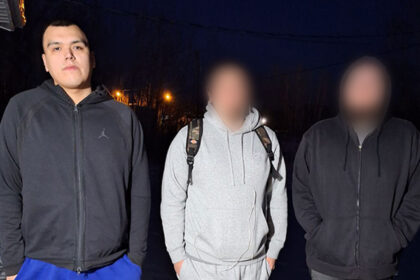ManitobaWrapped in the Sayisi Dene First Nation flag, a woman from the northern Manitoba First Nation was greeted by a cheering crowd on Sunday as she arrived at The Forks after a gruelling 15-day journey from Thompson to Winnipeg on foot.Samantha Powderhorn and partner Luther Alexander arrived at The Forks on Sunday to celebrate H.O.P.E. movementLauren Scott · CBC News · Posted: Aug 31, 2025 10:38 PM EDT | Last Updated: 1 hour agoSamantha Powderhorn ran and walked nearly 800 kilometres alongside her partner Luther Alexander from Thompson to Winnipeg, where they completed their journey on Sunday. (Rudi Pawlychyn/CBC)Wrapped in the Sayisi Dene First Nation flag, a woman from the northern Manitoba First Nation was greeted by a cheering crowd on Sunday as she arrived at The Forks after a gruelling 15-day journey from Thompson to Winnipeg on foot. Samantha Powderhorn ran and walked nearly 800 kilometres alongside her partner Luther Alexander, a member of Pine Creek First Nation, as part of their H.O.P.E. movement to highlight the gaps in addictions and mental health services in remote northern First Nations. H.O.P.E. stands for healing overcomes past experiences. Powderhorn said reconnecting with her culture and traditional practices helped her on her journey moving through addiction to sobriety. She wants to inspire others to do the same, she said. “When I was highly addicted, I was ashamed of who I was … I’m proud to say who I am now because reconnecting with my language, with the culture, with the drum is … very powerful,” she said. “The drum is close to my heart and hearing it makes me feel very connected to who and where I come from.”Manitoba Keewatinowi Okimakanak Grand Chief Garrison Settee said Samantha Powderhorn has demonstrated “a warrior’s spirit” throughout her nearly 800-kilometre trek on foot from Thompson to Winnipeg. (Assembly of Manitoba Chiefs/Facebook)A line of half a dozen drummers played as the beat welcomed her into the Oodena Celebration Circle with Alexander at her side on Sunday, which was International Overdose Awareness Day.”It’s very important that we reconnect. When we reconnect, we allow ourselves to start our healing journey and substance misuse really blocks that,” she said. The pair were welcomed by leaders from First Nations across the province — from Tadoule Lake, nearly 1,000 kilometres north of Winnipeg, to Pine Creek, about 300 kilometres northwest of the provincial capital. “I want to say to Samantha, thank you for having the courage to bring this message across,” Manitoba Keewatinowi Okimakanak Grand Chief Garrison Settee said standing next to Powderhorn on Sunday. “She has demonstrated a warrior’s spirit this afternoon.” Samantha Powderhorn, a member of the Sayisi Dene First Nation, and partner Luther Alexander, a member of Pine Creek First Nation, were gifted star blankets after they travelled hundreds of kilometres on foot to raise awareness of the gaps in addictions and mental health services in remote northern First Nations. (Assembly of Manitoba Chiefs/Facebook)”She’s not doing it for herself. She’s doing it for us. She’s doing it for our people up north, she’s doing it for the Dene, she’s doing it for the Cree, and she’s doing it for everybody,” he said. Sayisi Dene First Nation Chief Kelly Ann Thom-Duck said she grew up with Powderhorn and has always looked up to her as a role model. “What you’ve done today is amazing, it’s tremendous,” she said. Community members held an honouring ceremony for Powderhorn and Alexander, where their feet were given a cleaning cedar wash after carrying them for hundreds of kilometres, and they were gifted star blankets. Powderhorn said the H.O.P.E. movement aims to bring focus to Call to Action No. 21 of the Truth and Reconciliation Commission — to provide sustainable funding for new and existing Indigenous healing centres, including addictions and mental health supports. “There is a humanitarian crisis up north and it’s mental health and addictions that are the root cause of many of these situations that people are in. We want to help these folks,” Alexander said. “Hope is there, that’s why we have it on our chests today and that’s why we ran for 15 days” he said. ABOUT THE AUTHORLauren Scott is a Winnipeg-based reporter with CBC Manitoba. They hold a master’s degree in computational and data journalism, and have previously worked for the Hamilton Spectator and The Canadian Press.With files from Gavin Axelrod
Friday, 6 Feb 2026
Canada – The Illusion
Search
Have an existing account?
Sign In
© 2022 Foxiz News Network. Ruby Design Company. All Rights Reserved.
You May also Like
- More News:
- history
- Standing Bear Network
- John Gonzalez
- ᐊᔭᐦᑊ ayahp — It happened
- Creation
- Beneath the Water
- Olympic gold medal
- Jim Thorpe
- type O blood
- the bringer of life
- Raven
- Wás’agi
- NoiseCat
- 'Sugarcane'
- The rivers still sing
- ᑲᓂᐸᐏᐟ ᒪᐢᑿ
- ᐅᑳᐤ okâw — We remember
- ᐊᓂᓈᐯᐃᐧᐣ aninâpêwin — Truth
- This is what it means to be human.
- Nokoma











